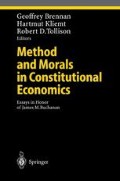Abstract
Fundamental to the economic approach to human behavior is the notion that people are motivated by self-interest in the sense that, if faced with a choice among alternative courses of action, they do what, in their view, best serves their own interests. Ethics, on the other hand, is based on the idea that there exist rules of moral conduct, and that people are not permitted simply to pursue their own interests, but are obliged to conform to these rules.
This paper was originally written in German. A translation draft was prepared by Linda O’Riordan at the Institute for Advanced Study Berlin and revised by the author. I am grateful to her and to the Institute for its support of this project.
Access this chapter
Tax calculation will be finalised at checkout
Purchases are for personal use only
Preview
Unable to display preview. Download preview PDF.
References
Apel, Karl-Orro (1997): “Institutionsethik oder Diskursethik als Verantwortungsethik?”, in: J.-P. Harpes, W. Kuhlmann (Eds.): Zur Relevanz der Diskursethik, Münster (Lit), pp. 167–209.
Baurmann, Michael (1996): Der Markt der Tugend — Recht und Moral in der liberalen Gesellschaft, Tübingen (J.C.B. Mohr, Paul Siebeck).
Böhm, Franz (1966): “Privatrechtsgesellschaft und Marktwirtschaft,” Ordo, 17, pp. 75–151. Reprinted in: BÖHM (1980), pp. 105–168.
Böhm, Franz (1980): Freiheit und Ordnung in der Marktwirtschaft, ed. by E.-J. Mestmäcker, Baden Baden (Nomos).
Buchanan, James M (1962): “Marginal Notes on Reading Political Philosophy”, in: J.M. Buchanan UND G. Tullock (1962), pp. 307–322.
Buchanan, James M (1990): “The Domain of Constitutional Economics”, Constitutional Political Economy, 1, pp. 1–18.
Buchanan, James M. (1991): The Economics and Ethics of Constitutional Order,Ann Arbor (The University of Michigan Press).
Buchanan James M. ANDGordon Tullock (1962): The Calculus of Consent — Logical Foundations of Constitutional Democracy,Ann Arbor (The University of Michigan Press).
Buchanan James M. et al. (Eds.) (1980): Toward a Theory of the Rent-Seeking Society,College Station (Texas A and M University Press).
Buchanan James M. AND RogerD. Congleton(1998): Politics by Principle, Not Interest: Toward Nondiscriminatory Democracy,Cambridge and New York (Cambridge University Press).
Campbell, Donald T (1986): “Rationality and Utility from the Standpoint of Evolutionary Biology”, in: R.M. Hogarth Und M.W. Reder (Eds.): Rational Choice — The Contrast between Economics and Psychology, Chicago and London (The University of Chicago Press), pp. 171–180.
Eucken, Walter (1990): Grundsätze der Wirtschaftspolitik, 6th ed., Tübingen (J.C.B. Mohr, Paul Siebeck).
Gauthier, David (1986): Morals by Agreement, Oxford (Oxford University Press). Habermas, Juergen (1991): Erläuterungen zur Diskursethik, Frankfurt a.M. ( Suhrkamp).
Hayek, Friedrich A (1969): “Rechtsordnung und Handelnsordnung”, in: Freiburger Studien, Tübingen (J.C.B. Mohr, Paul Siebeck ), pp. 161–198.
Hayek Friedrich A. (1979): Law, Legislation and Liberty, Vol 3, London and Henley (Routledge & Kegan Paul).
Heiner, Ronald A (1990): “Rule-governed behavior in evolution and human society”, Constitutional Political Economy, 1, pp. 19–46.
Holland John H. (1995)• Hidden Order — How Adaptation Builds Complexity,Reading, Mass. (Helix Books).
Homann Karl AND Franz Blome-Drees (1992): Wirtschafts-und Unternehmensethik,Göttingen (Vandenhoeck & Ruprecht).
Nozick, Robert (1974): Anarchy, State and Utopia, New York (Basic Books). Rawls, John (1971): A Theory of Justice, Cambridge, Mass. (Harvard University Press).
Tooby John And LedaCosmides(1992): “The Psychological Foundations of Culture”, in: J.H. Barkov L. Cosmides AND J. Tooby(Eds.): The Adapted Mind — Evolutionary Psychology and the Generation of Culture,New York und Oxford (Oxford University Press), pp. 19–136.
Ulrich, Peter (1996): “Brent Spar und der ‘moral point of view’, Die Unternehmung, pp. 27–46.
Vanberg, Viktor (1987): “Erkenntnis, Interesse und Moral”, in: O. MOLDEN (Ed.), Erkenntnis und Entscheidung (European Forum Alpbach 1987), Vienna 1987, pp. 329–335.
Vanberg, Viktor (1988): “’Ordnungstheorie’ as Constitutional Economics. The German Conception of a ‘Social Market Economy’, Ordo, 39, pp. 17–31.
Vanberg, Viktor (1994): Rules and Choice in Economics, London and New York: ( Routledge).
Vanberg, Viktor(1997a): “Die normativen Grundlagen von Ordnungspolitik”, Ordo, 48, pp. 707–726.
Vanberg, Viktor (1997b): “Moral und Interesse, Ethik und Oekonomik”, in: R. Hegselmann Und H. Klient (Eds.): Moral und Interesse — Zur interdisziplinären Erneuerung der Moralwissenschaft, München (Oldenbourg), pp. 167–181.
Vanberg, Viktor (1998a): “Freiburg School of Law and Economics”, in: P. Newman (Ed.): The New Palgrave Dictionary of Economics and the Law, Vol. 2, London (Macmillan), pp. 172–179.
Vanberg, Viktor (1998b): “Constitutional Economics”, in: J.B. Davis, D.W. Hands, U. Maeki (Eds.): The Handbook of Economic Methodology, Cheltenham and Northampton (Edward Elgar), pp. 69–75.
Vanberg, Viktor (1999): “Der konstitutionnökonomische Ansatz von J.M. Buchanan”, in: W. Korff et al. (Eds.): Handbuch der Wirtschaftsethik, Vol. 1 (Verhältnisbestimmung von Wirtschaft und Ethik), Gütersloh (Gütersloher Verlagshaus), pp. 502–507.
Vanberg, Viktor AND Roger D. Congleton(1992): “Rationality, Morality and Exit”, American Political Science Review, Vol. 86, pp. 418–31.
Editor information
Editors and Affiliations
Rights and permissions
Copyright information
© 2002 Springer-Verlag Berlin Heidelberg
About this chapter
Cite this chapter
Vanberg, V.J. (2002). Constitutional Economics and Ethics — On the Relation Between Self-Interest and Morality. In: Brennan, G., Kliemt, H., Tollison, R.D. (eds) Method and Morals in Constitutional Economics. Studies in Economic Ethics and Philosophy. Springer, Berlin, Heidelberg. https://doi.org/10.1007/978-3-662-04810-8_29
Download citation
DOI: https://doi.org/10.1007/978-3-662-04810-8_29
Publisher Name: Springer, Berlin, Heidelberg
Print ISBN: 978-3-642-07551-3
Online ISBN: 978-3-662-04810-8
eBook Packages: Springer Book Archive

